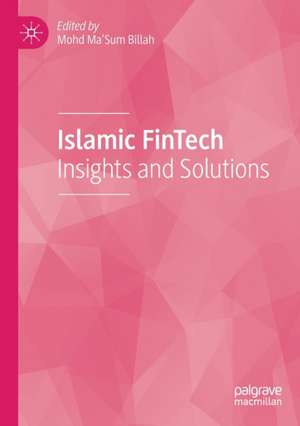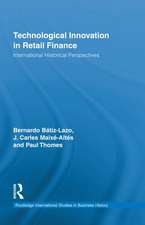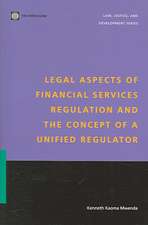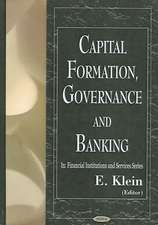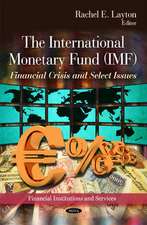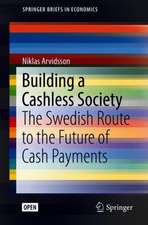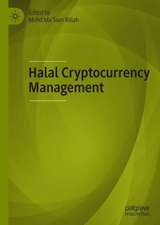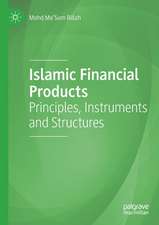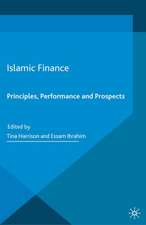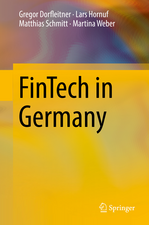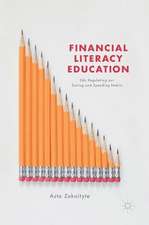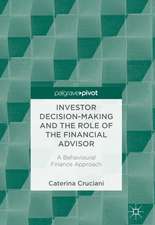Islamic FinTech: Insights and Solutions
Editat de Mohd Ma'Sum Billahen Limba Engleză Paperback – 28 ian 2022
| Toate formatele și edițiile | Preț | Express |
|---|---|---|
| Paperback (1) | 950.96 lei 6-8 săpt. | |
| Springer International Publishing – 28 ian 2022 | 950.96 lei 6-8 săpt. | |
| Hardback (1) | 956.33 lei 6-8 săpt. | |
| Springer International Publishing – 28 ian 2021 | 956.33 lei 6-8 săpt. |
Preț: 950.96 lei
Preț vechi: 1159.71 lei
-18% Nou
Puncte Express: 1426
Preț estimativ în valută:
181.99€ • 197.61$ • 152.87£
181.99€ • 197.61$ • 152.87£
Carte tipărită la comandă
Livrare economică 23 aprilie-07 mai
Preluare comenzi: 021 569.72.76
Specificații
ISBN-13: 9783030458294
ISBN-10: 3030458296
Ilustrații: XLIV, 465 p. 34 illus., 3 illus. in color.
Dimensiuni: 148 x 210 mm
Greutate: 0.6 kg
Ediția:1st ed. 2021
Editura: Springer International Publishing
Colecția Palgrave Macmillan
Locul publicării:Cham, Switzerland
ISBN-10: 3030458296
Ilustrații: XLIV, 465 p. 34 illus., 3 illus. in color.
Dimensiuni: 148 x 210 mm
Greutate: 0.6 kg
Ediția:1st ed. 2021
Editura: Springer International Publishing
Colecția Palgrave Macmillan
Locul publicării:Cham, Switzerland
Cuprins
1. Emergence of i-FinTech in the Contemporary Socio-economic Reality.- 2. FinTech Vs. i-FinTech: A Dichotomy.- 3. FinTech and Maqāsid Dichotomy under the Prism of the Non-Neutrality of Techniques.- 4. Central Banks and Financial Authorities: Towards the Advancement of I-Fintech.- 5. Analysis of Fatwas on FinTech.- 6. An Evaluation of Smart Contracts: Practices, Legality, and Shari'ah.- 7. Digital Smart Contracts: Legal and Shari'ah Issues.- 8. Judicial Procedures in I-Fintech: The Malaysian Experience.- 9. The Forms and Effects of Cryptocurrencies in a Dual Banking System.- 10. Islamic FinTech and Financial Inclusion.- 11. Enhancing Financial Inclusion Using FinTech-Based Payment System.- 12. Islamic FinTech and Financial Inclusion.- 13. Utilization of Digital Technology for Zakat Development.- 14. I-FinTech and Its Value Proposition for Islamic Asset and Wealth Management.- 15. The Opportunities of Digital Wallets from an IslamicPerspective.- 16. The Optimization of Blockchain for Greater Transparency in Zakat Management.- 17. Zakat Digital Management Techniques.- 18. Zakat Calculation Software for Corporate Entities.- 19. FinTech in the MENA Region: Current States and Prospects.- 20. The Risks of Islamic FinTech.- 21. TakafulTech for Business Excellence and Customer Satisfaction.- 22. The Challenges of Cryptocurrencies and the Shari'ah Paradigm.- 23. Digital Technology and Its Impact on Islamic Social Finance Literacy.- 24. The Direction of Future Research on i-FinTech.
Notă biografică
Mohd Ma’Sum Billah is a Professor of Finance, Insurance, FinTech and Investment at the Islamic Economics Institute of King Abdul Aziz University, Kingdom of Saudi Arabia. He is an internationally renowned Islamic finance scholar. He has served and contributed to academia and corporate industries for over 20 years providing management, teaching, research and problem-solving, particularly in the areas of Islamic finance and insurance (Takaful), and the Halal standard. Mohd has published 32 books and chapters in books as well as over 200 articles in journals and on social media. He has presented at numerous conferences, seminars, executive workshops and industrial training sessions around the globe. In addition, he has been affiliated with various companies, universities and financial institutions including central banks, international corporate organisations, governments and NGOs in his capacity as a member on boards, an advisor, a strategic decision-maker and a reformer with a strategic solution-provider. His areas of interest include Islamic finance and insurance (Takaful), crowdfunding, investment, Waqf, capital markets (Sukuk), social finance, the SDGs and FinTech.
Textul de pe ultima copertă
This timely book addresses the effects and implications of rapid technological changes within the financial services industry on Islamic finance and Islamic banks. Exploring current challenges, opportunities and threats, the authors provide an overview of how FinTech can operate within an Islamic context, under the Shari’ah principles or the Halal framework, for example. Examining the potential opportunities of Islamic FinTech from a socio-economic perspective, this edited collection will be of use to anyone researching FinTech or Islamic Finance as well as practitioners and policy-makers involved in banking and financial services.
Caracteristici
Explores FinTech from both Shari’ah and corporate perspectives, exploring it as a global phenomenon Provides analysis of the Shari’ah model of FinTech, presenting a SWOT analysis and outlining conventional practices Examines the opportunities, risks and takaful solutions that Islamic FinTech presents and covers regulatory standards and frameworks
